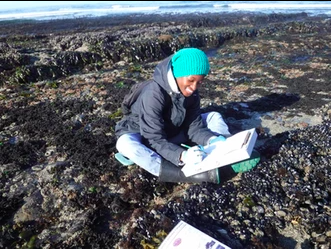Turning Up the Heat on Climate Change – Xochitl Clare

Q: From your project, it is clear that you’re very interested in completing research, but equally as passionate about spreading awareness of the ocean. What is it that led you to take a multimedia science approach towards sharing your research with the public?
A: Despite not living far from the ocean, financial hardship made the ocean hard to reach for me as a child. Always seen as a “different” face in STEM, from an early age, I have seen how traditional marine science education can alienate communities from their own environment. Today, my firsthand insight on socioeconomic challenges associated with interacting with the marine world empowers me with insight on how to increase public engagement in marine sciences. I am motivated to lead multifaceted investigations of the marine world via a diversity of interactive experiences (film, theater, storytelling, virtual experiences, etc.) that will expand the ways we do ocean education.
Q: What personally brought your attention to marine life along the coastline?
A: As a first generation Hispanic African American with Caribbean heritage, the importance of life at sea is in our folktales, music, and food. Coastal ecosystems play a vital role in supporting human ecosystems, especially in island nations where many make their livelihoods on the water. To conserve our oceans, I provide my scientific and cultural awareness of the intimate relationship between human lives and the coastline. I am passionate about my coastal research here at UCSB because it presents a unique way to help researchers and the public see the interconnectedness between human lives and the marine environment within my community.
Q: What led you to specifically choosing the REEF as the location for your experiment-display?
A: Education can be a final step of research wherein science can have a lasting impact—for both students and instructors. I am motivated to help undergraduates build and share their own narratives: telling your own story, describing your work, through your own voice—helps young scientists and their communities self-identify with their personal relationships with marine science. Staging my experiment-display at the UCSB Research Experience & Education Facility (REEF) will allow just that. After spending time mentoring undergraduates at the REEF, who are already trained in doing marine science outreach for thousands of people within and beyond the Santa Barbara community, I wanted to help REEF undergraduates take it further by helping them with communicating their own scientific findings in real-time with communities they are already deeply involved with.
Q: Outside of your science-based interests, what else are you passionate about? Do you feel that these passions help you in your research?
A: Aside from my marine biology work, I am a theater producer, performer, and director. At the University of California, Santa Cruz, I took on a double major in both Marine Biology and Theater Arts (2017). At the time, all I knew was that I could not do one without the other. Today, I am a global change marine biologist who studies both human and marine communities through my perspective as performing artist to reach my goals of supporting academic recruitment and retention in marine sciences. While a seemingly unlikely pairing of disciplines, theatrical techniques equip me with a strengthened cognitive lens as a marine ecologist and educator. As an early theater artist, I saw that theatrical investigations intrinsically develop a sense of global connectivity via emotional engagement in educational settings—this was something I saw that is still somewhat missing in many introductory science educational settings—despite the many studies that have shown that we need to make real emotional connections to learn. In my current Theater-STEM work I hope to appeal to many who learn like me: who need to hear the story of the coastline, the fishermen, the scientists, and the history of the communities—human and otherwise, that make up our aquatic world, to truly understand and feel inspired by it.
Q: Is there anything that you would want people to know about you, your project, or something that you are passionate about?
A: Never has it been more important to understand our coastline—and for scientists to grow strong relationships with the public. Because climate change will influence global management of natural resources, it represents significant environmental and social challenges in our future. I am determined to ensure individuals from a wide range of backgrounds are able to tackle these challenges. I am excited to engage undergraduates in my research on a emerging seafood species found along the Santa Barbara coast while helping them develop marine science stewardship their own communities with the support of the Coastal Fund.
